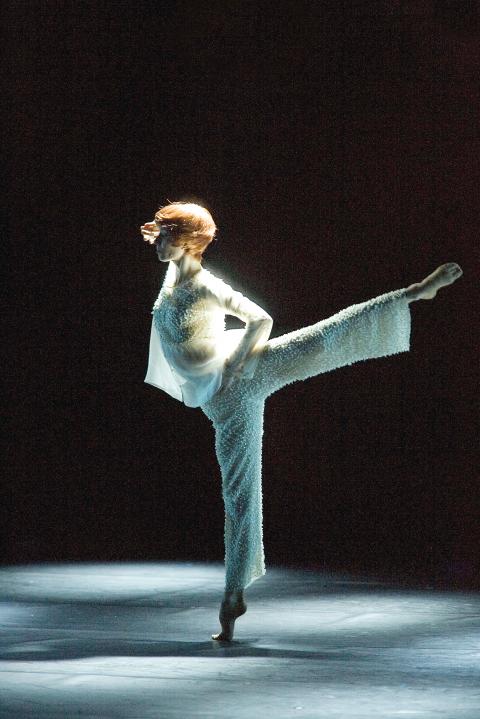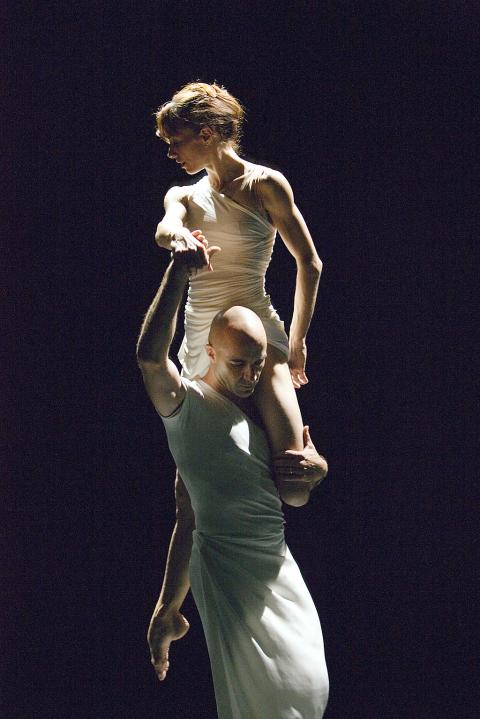I was a bundle of nerves heading to the Regent Hotel Taipei on Tuesday to interview French ballerina Sylvie Guillem, one of the dance world’s legends.
From what I had read and heard, she has a reputation for being somewhat prickly in interviews. Plus there is the old “Madame Non” nickname that has followed her for years.
That anxiety quickly dissipated after Guillem appeared in the lobby, showered and changed after a morning class and rehearsal at the National Theater, where she and British choreographer/dancer Russell Maliphant will be performing a program of his dances this weekend, entitled Push.

Photo Courtesy of Bill Cooper
Casually dressed, hair loose and make-up free, Guillem turned out to be approachable, funny and willing to talk about everything from Push, how she chooses her collaborators and the difficulty of being a vegan in France, to her environmental activism and the question on everyone’s mind: when she will bring the curtain down on her dancing days.
We started off talking about eating, because promoter Wang Tzer-shing (王澤馨), whose company Art Wave Inc, brought Guillem to Taipei in April with her 6000 Miles Away and organized this week’s visit, had been talking before Guillem arrived about the difficulty of finding someplace with vegan food for a post-show meal.
VEGAN

Photo Courtesy of Johan Perrsson
Guillem said that being a vegan is an extension of her environmental concerns. The switch came as something of a surprise, she said, given her love of charcuterie as a child.
“If you want to be ‘healthy,’ you add salad,” she quipped, talking about her younger days.
Getting back to the topic of dance, I asked about Maliphant, another Royal Ballet alumni, whom she had first worked with on Broken Fall (2004) in London, along with Balletboyz, which won an Olivier award for best new dance production.
She said she enjoyed working with the choreographer on that show.
“It’s difficult, taste, what attracts you. It’s experience. There are things I love, but I know I can’t do. I wanted to experience, to be part of it [the creation], not just be a spectator. I prefer there is an intelligence in what they do, a real language, a real way of expressing, like [George] Balanchine, [William] Forsythe. A language you can’t deny.”
Choreographers who just recycle others’ ideas or language don’t “talk” to her, she said.
“Maliphant has a different energy, very controlled … very soft, like poetry. Using simple words, the way he puts it, the imagery,” she said, adding that his style is very different from fellow British choreographer Akram Khan, a fellow associate artist at London’s Sadlers’ Wells theater, who created a show, Sacred Monsters, for her.
Khan asked Cloud Gate Dance Theatre (雲門舞集) founder Lin Hwai-min (林懷民) to create a solo for Guillem for that show. I told her that Lin called her “fearless” in reminiscing about her backflips and she laughed.
“I have doubts and fears about everything, but you have to fight it. As a kid I was very shy, I couldn’t go into a room of strangers, ask questions, raise my hand … You have to fetch the courage. It’s also instinct,” she said, adding that she won’t compromise intellectually, artistically or emotionally.
ON HER OWN
Another surprising thing about Guillem is that she handles her own bookings, having done without an agent or manager for years.
“You just need to have a good contract, a good lawyer ... [And] now there’s the Internet, it’s easier.”
The big question that hangs over any interview with Guillem, 49, is how long she will continue dancing.
“I don’t want to deceive myself, I am still doing something I like ... But I am going to stop soon ... because I want to do something else. There is a time for age, I’ve known this since I was a kid. Time is passing; accept it. Not sure I will like it.”
I mentioned Alicia Alonso, the 91-year-old grand dame of the Ballet Nacional de Cuba, who continued to dance into her 70s.
Guillem smiled. “I didn’t say her name, I am not going to say her name. I will say I don’t want to be the [Marcel] Marceau of dance,” referring to the French mime legend who performed almost up until his death in 2007 at age 84.
ENVIRONMENTAL CONCERNS
The environment has been a concern for Guillem for many years, and she sits on the board of the Sea Shepherd organization.
“I have always been concerned about the environment. It is important that I do my part the best way I can.”
“So many terrible things were done over the past century and people said: ‘I didn’t know.’ But now they can’t say that. We don’t have the right to say that anymore,” she said while talking about a visit to the Faroe Islands, where pilot whales are slaughtered en masse every year.
“The arrogance of human beings to think that everything is not connected,” she said.
THE FUTURE
As for the immediate future, she and Khan will return to Sadlers’ Wells in November to reprise Sacred Monsters and she has a few more shows of 6,000 Miles Away.
With two more dance projects in the planning stage — one with Khan and one with Maliphant — she is not quite willing to give up dance yet. And before that is Push at the National Theater on Saturday night and Sunday afternoon.
The 100-minute show consists of two solos for Guillem, one for Maliphant and then a duet. Their performances this summer at the London Coliseum, billed as the last in London for the show, which premiered in 2005, left hardened British critics gushing.

June 9 to June 15 A photo of two men riding trendy high-wheel Penny-Farthing bicycles past a Qing Dynasty gate aptly captures the essence of Taipei in 1897 — a newly colonized city on the cusp of great change. The Japanese began making significant modifications to the cityscape in 1899, tearing down Qing-era structures, widening boulevards and installing Western-style infrastructure and buildings. The photographer, Minosuke Imamura, only spent a year in Taiwan as a cartographer for the governor-general’s office, but he left behind a treasure trove of 130 images showing life at the onset of Japanese rule, spanning July 1897 to

One of the most important gripes that Taiwanese have about the Democratic Progressive Party (DPP) is that it has failed to deliver concretely on higher wages, housing prices and other bread-and-butter issues. The parallel complaint is that the DPP cares only about glamor issues, such as removing markers of Chinese Nationalist Party (KMT) colonialism by renaming them, or what the KMT codes as “de-Sinification.” Once again, as a critical election looms, the DPP is presenting evidence for that charge. The KMT was quick to jump on the recent proposal of the Ministry of the Interior (MOI) to rename roads that symbolize

On the evening of June 1, Control Yuan Secretary-General Lee Chun-yi (李俊俋) apologized and resigned in disgrace. His crime was instructing his driver to use a Control Yuan vehicle to transport his dog to a pet grooming salon. The Control Yuan is the government branch that investigates, audits and impeaches government officials for, among other things, misuse of government funds, so his misuse of a government vehicle was highly inappropriate. If this story were told to anyone living in the golden era of swaggering gangsters, flashy nouveau riche businessmen, and corrupt “black gold” politics of the 1980s and 1990s, they would have laughed.

In an interview posted online by United Daily News (UDN) on May 26, current Chinese Nationalist Party (KMT) Chairman Eric Chu (朱立倫) was asked about Taichung Mayor Lu Shiow-yen (盧秀燕) replacing him as party chair. Though not yet officially running, by the customs of Taiwan politics, Lu has been signalling she is both running for party chair and to be the party’s 2028 presidential candidate. She told an international media outlet that she was considering a run. She also gave a speech in Keelung on national priorities and foreign affairs. For details, see the May 23 edition of this column,